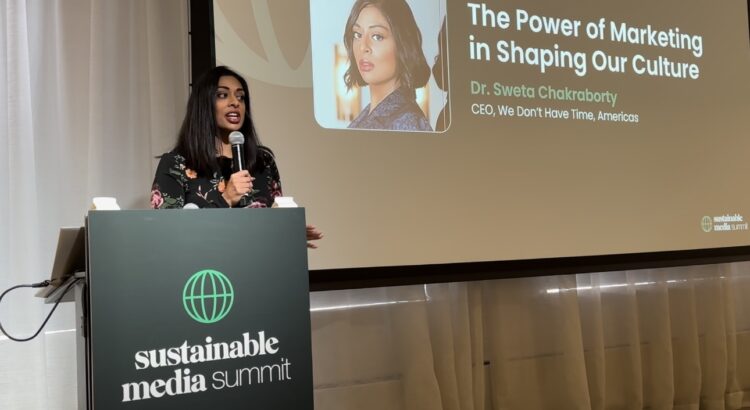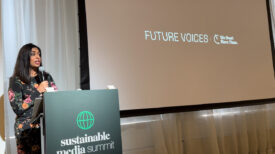Reframing consumption: how marketing can save the planet


Opinion
The power of marketing to shape consumer behavior was a central theme at the Sustainable Media Summit hosted by Horizon Media last week in New York. Dr. Sweta Chakraborty, Climate Behavioral Scientist and CEO of We Don’t Have Time North America, delivered a thought-provoking keynote address, urging the industry to leverage its expertise for a new purpose: sustainability.
Dr. Chakraborty argued that marketing, traditionally focused on driving consumption, has contributed to our current environmental challenges. “It is all about consumption. It is our children pointing to brands and we, the parents, giving in. And this is how we have engaged with our planet for decades in a way that has now become unsustainable”, she explained. To change the narrative, she proposed a future where marketing becomes a tool for positive change.
“We can create a psychotic state of PMS,” Dr. Chakraborty said, referencing a marketing campaign lead by pharmaceutical giant Eli Lilly where a natural hormonal change, PMS, was reframed as a medical condition called PMDD. This approach, according to Dr. Chakraborty, aimed to create a new market for the antidepressant Prozac, whose lucrative patent was set to expire. “This is the power of marketing. Now it’s time to use it for good.”
Behavioral science, Dr. Chakraborty suggests, holds the key. By understanding the decision-making processes in the human brain, marketers can craft messages that promote sustainable choices.
She highlighted the inherent human bias towards immediate threats, making climate change, a slow-moving crisis, difficult to grasp. “The media amplifies what makes headlines,” she said. “This is where marketing comes in. We need to make climate risk more accessible, more relatable.”

Dr. Chakraborty presented a case study – a campaign focused on everyday weather fluctuations – to illustrate how marketing can make sustainability tangible. Collaboration across industries, she emphasized, is crucial for creating impactful messaging.
The good news, according to Dr. Chakraborty, is a growing global consensus on the need for change. “Even the oil and gas industry is calling for a transition,” she said. “Let’s stop using marketing to create false needs and start using it to build a better future.”
Dr. Chakraborty’s call to action resonated with the audience of media and advertising professionals. The summit served as a springboard for discussions on how marketing can be a powerful force for environmental good, moving beyond consumption and promoting a culture of sustainability.
